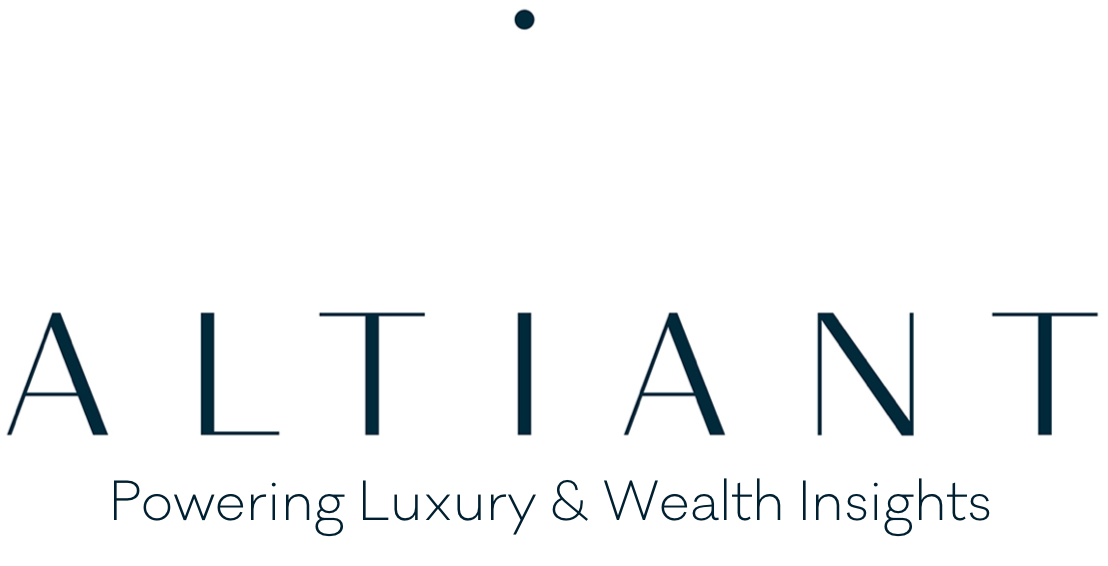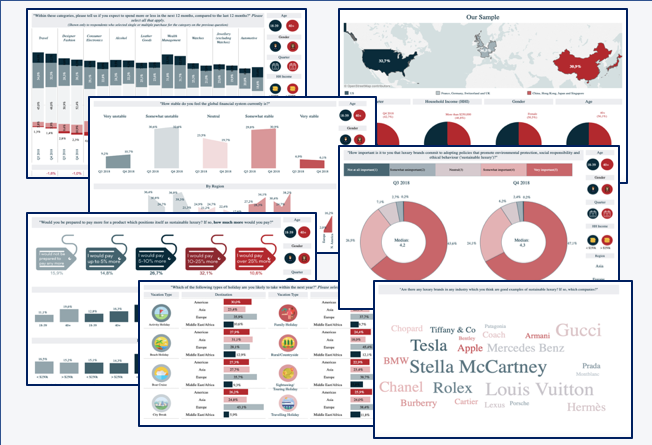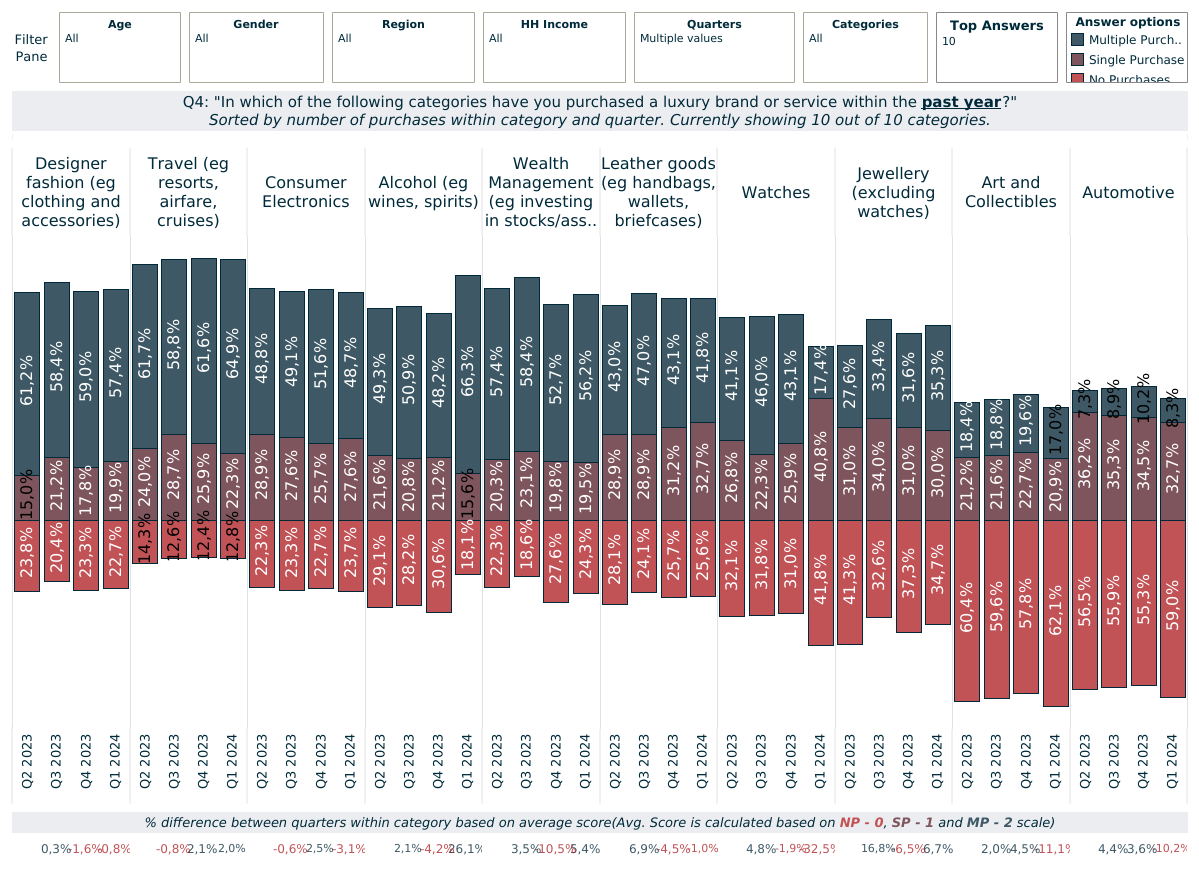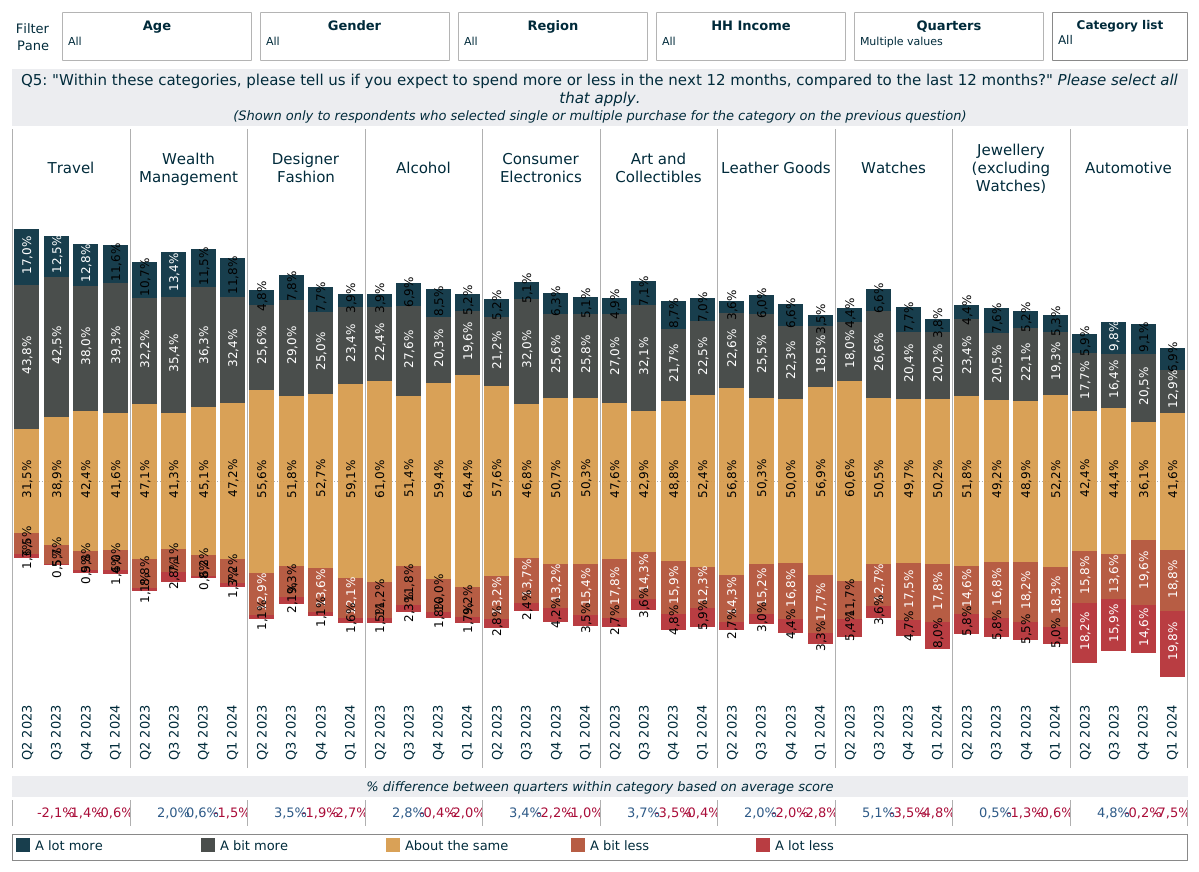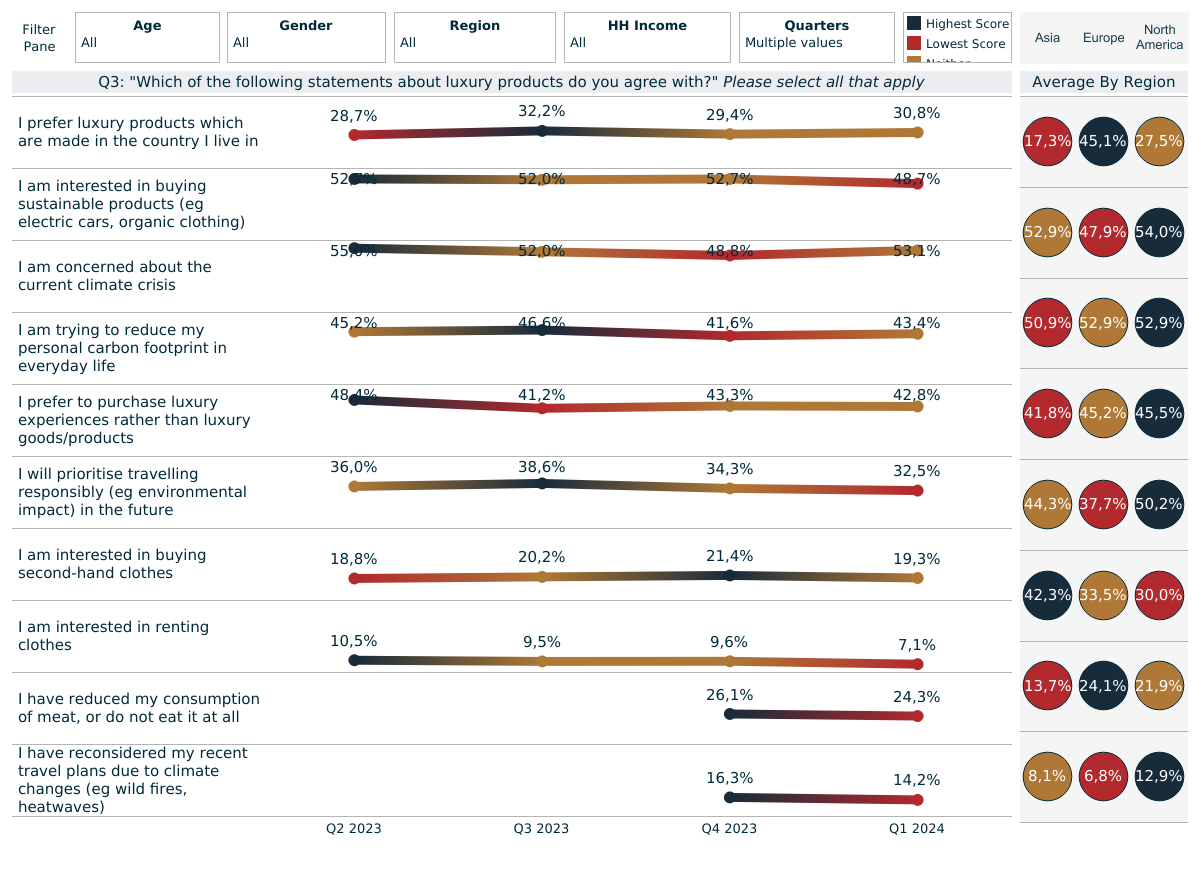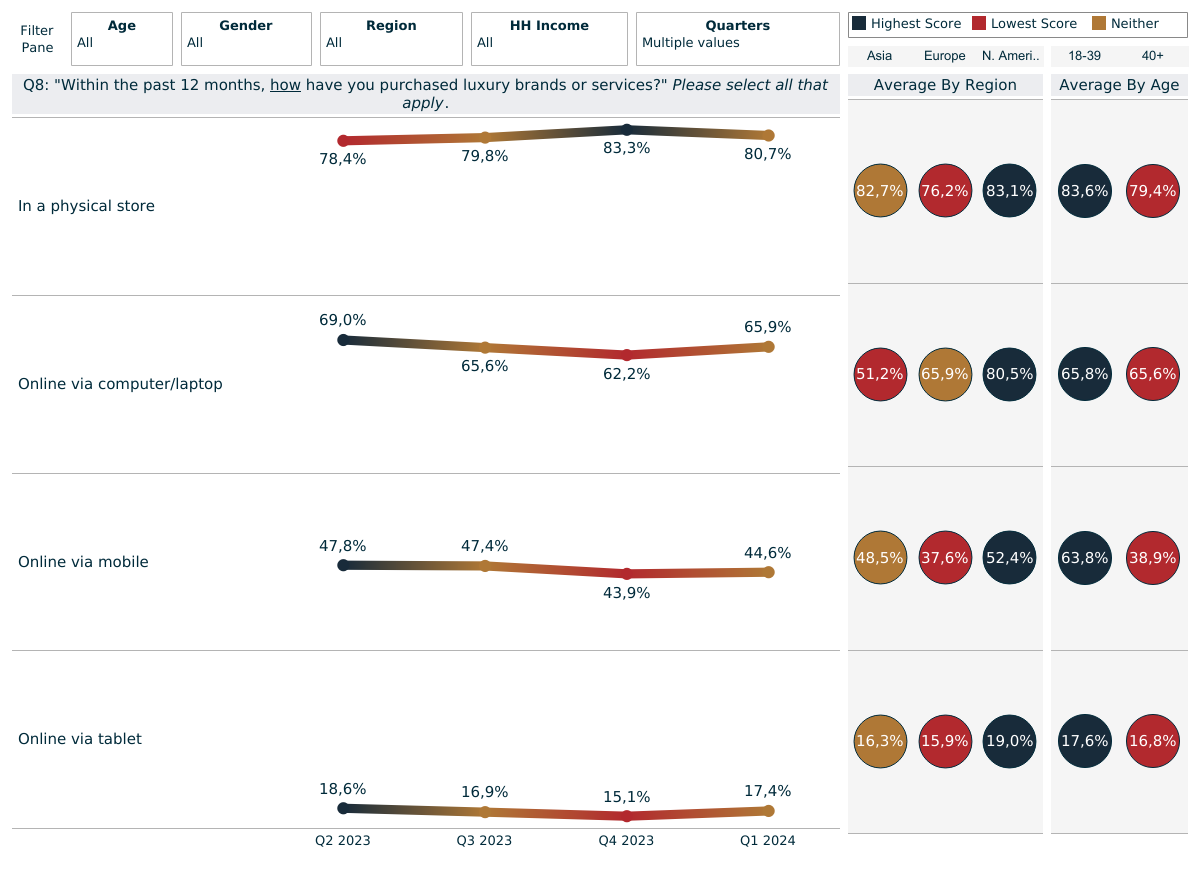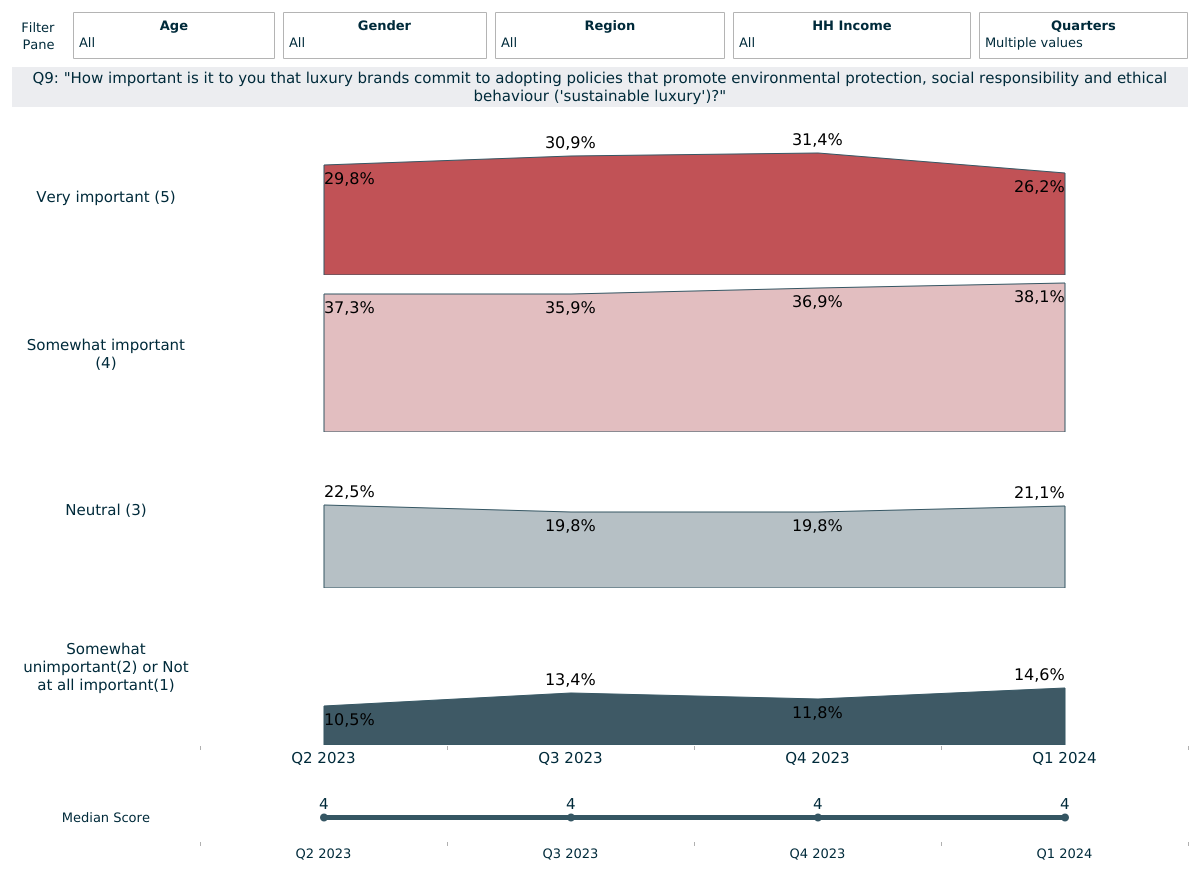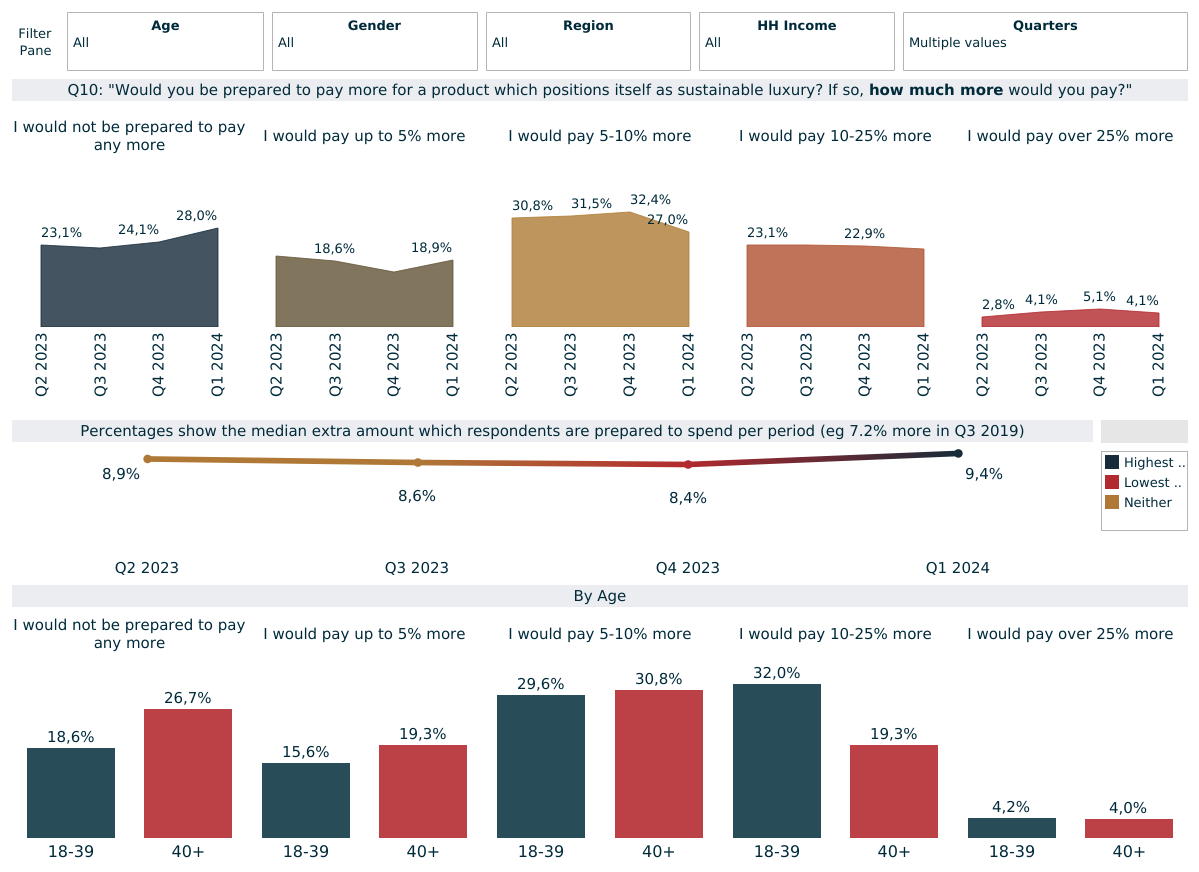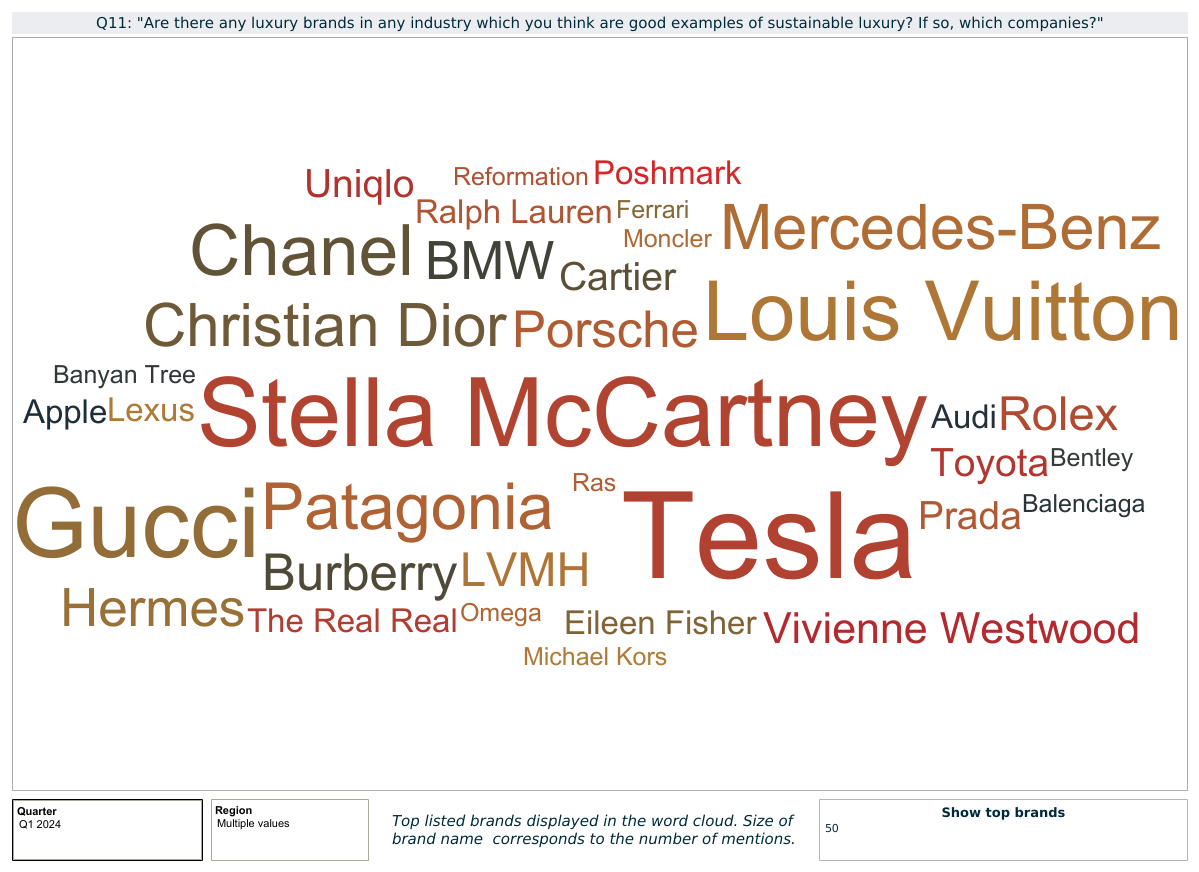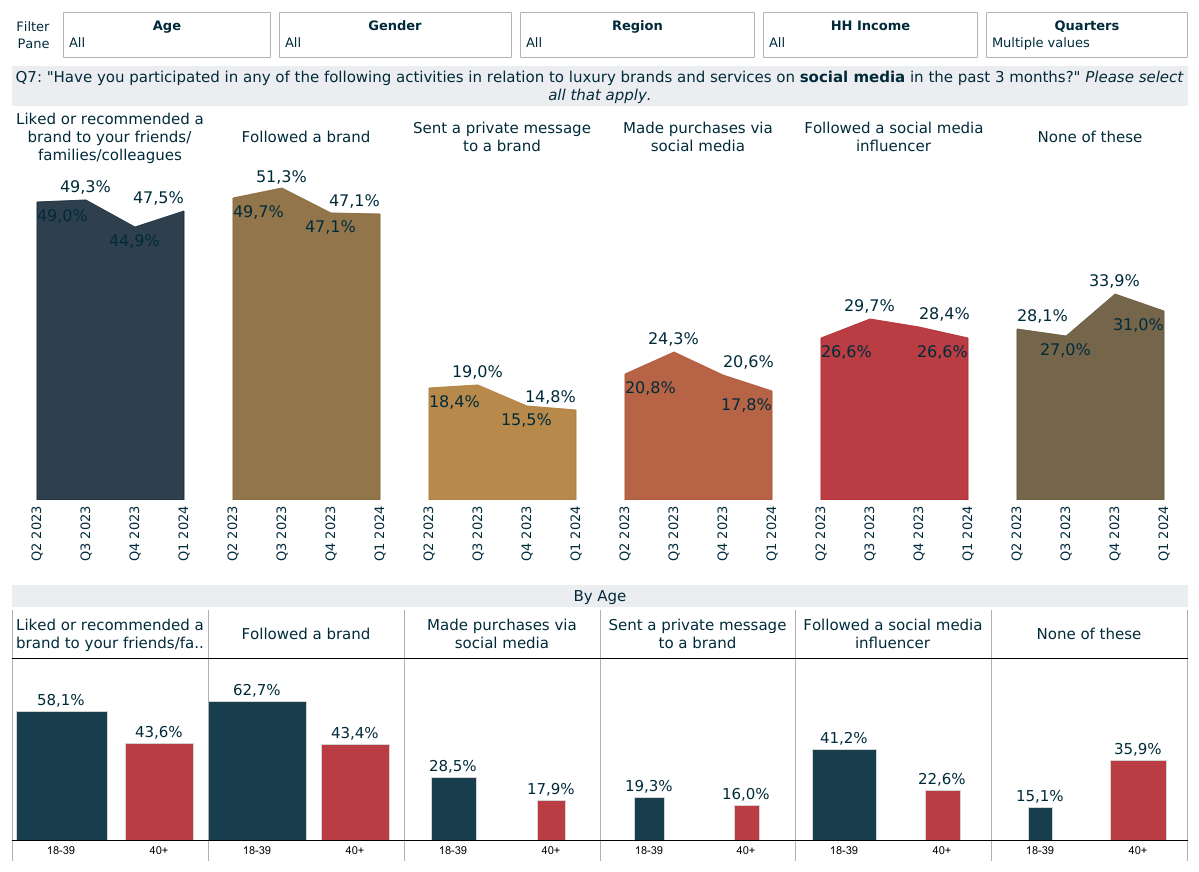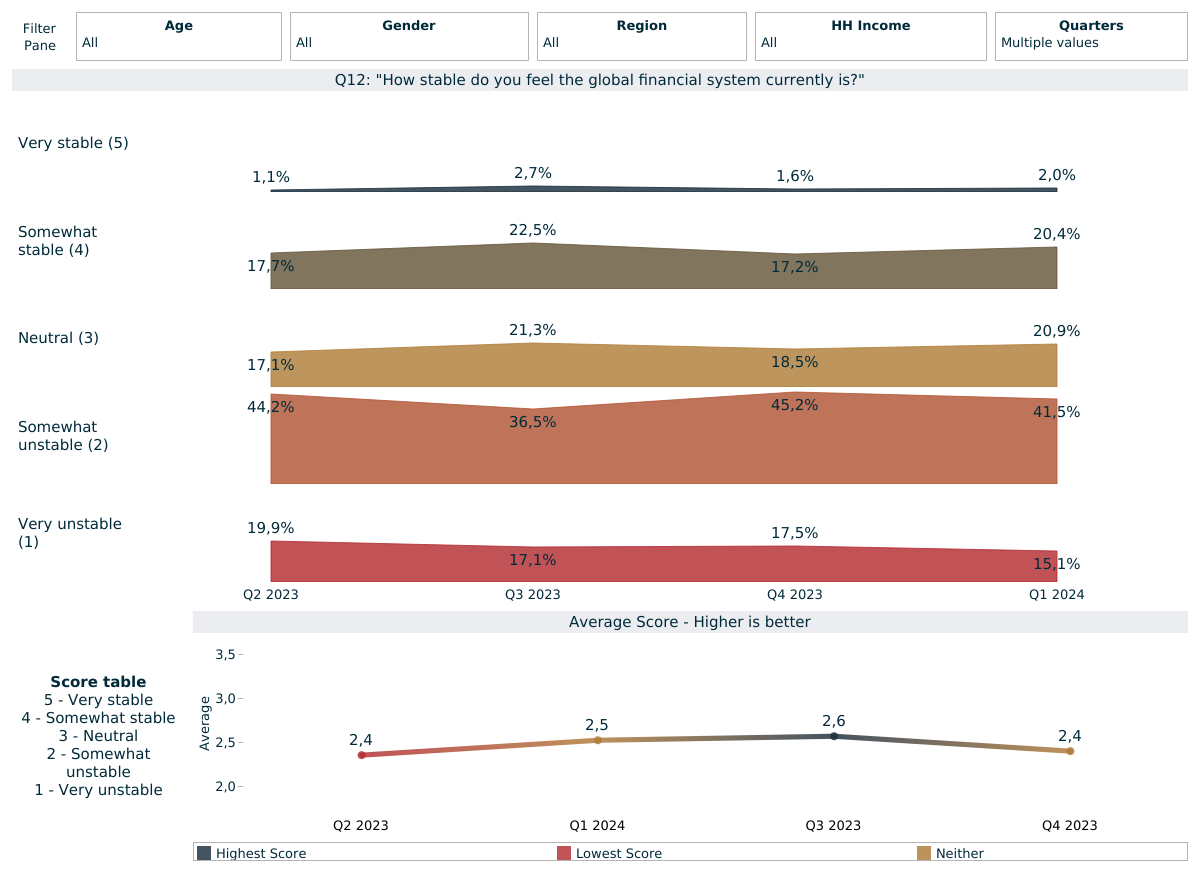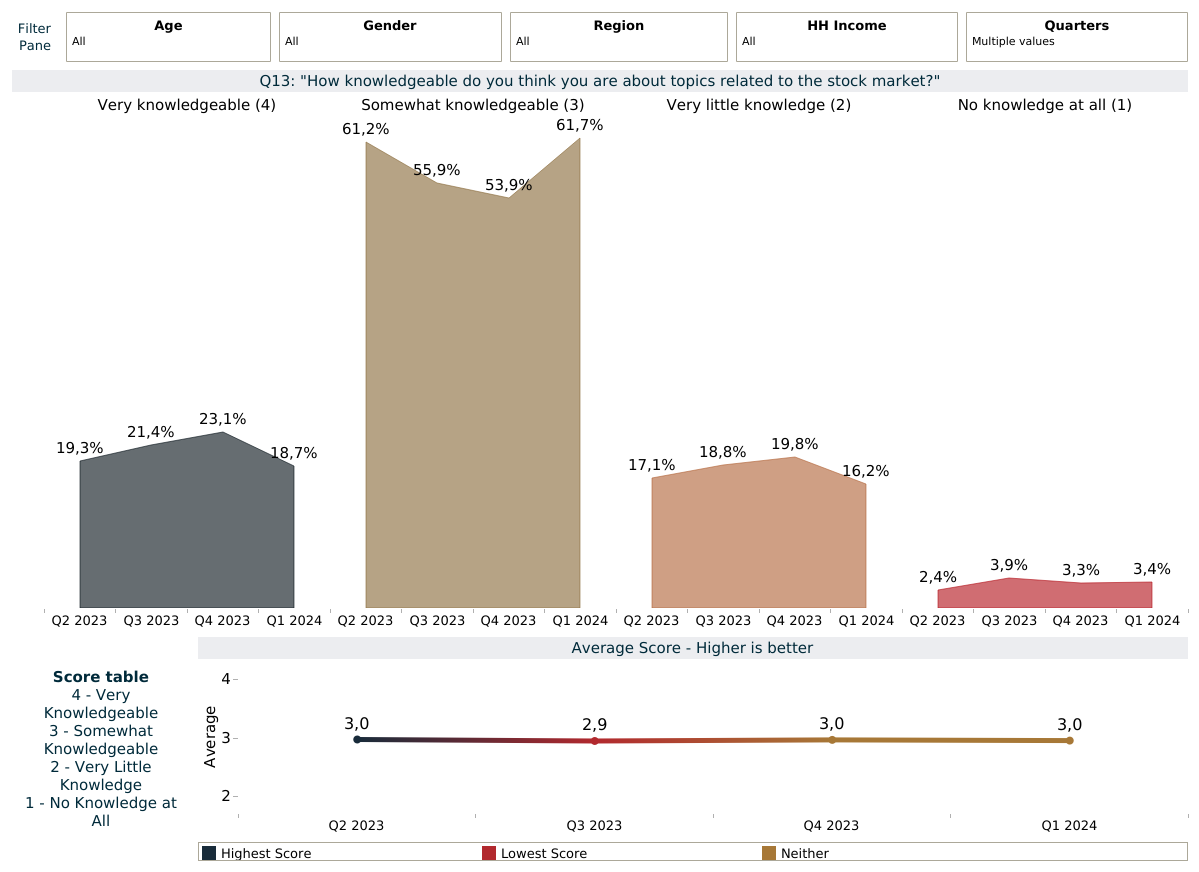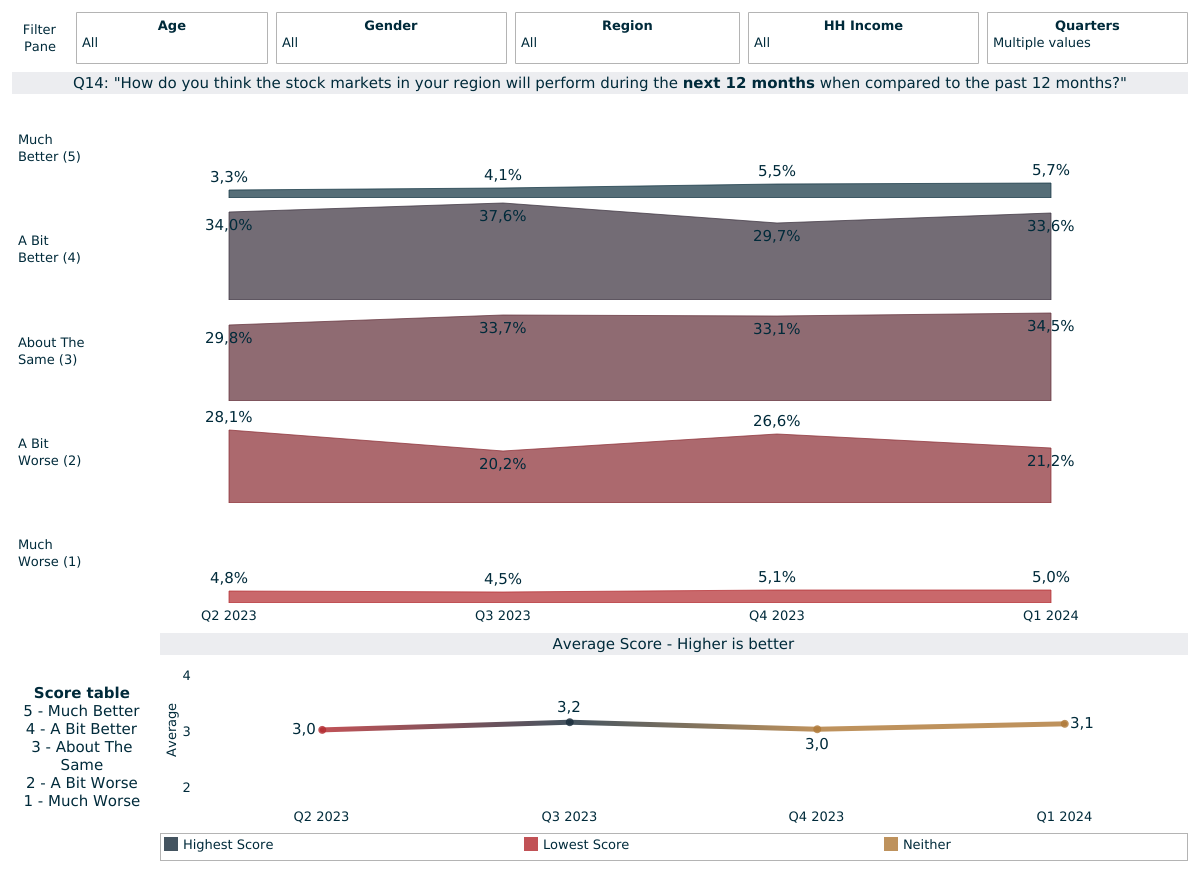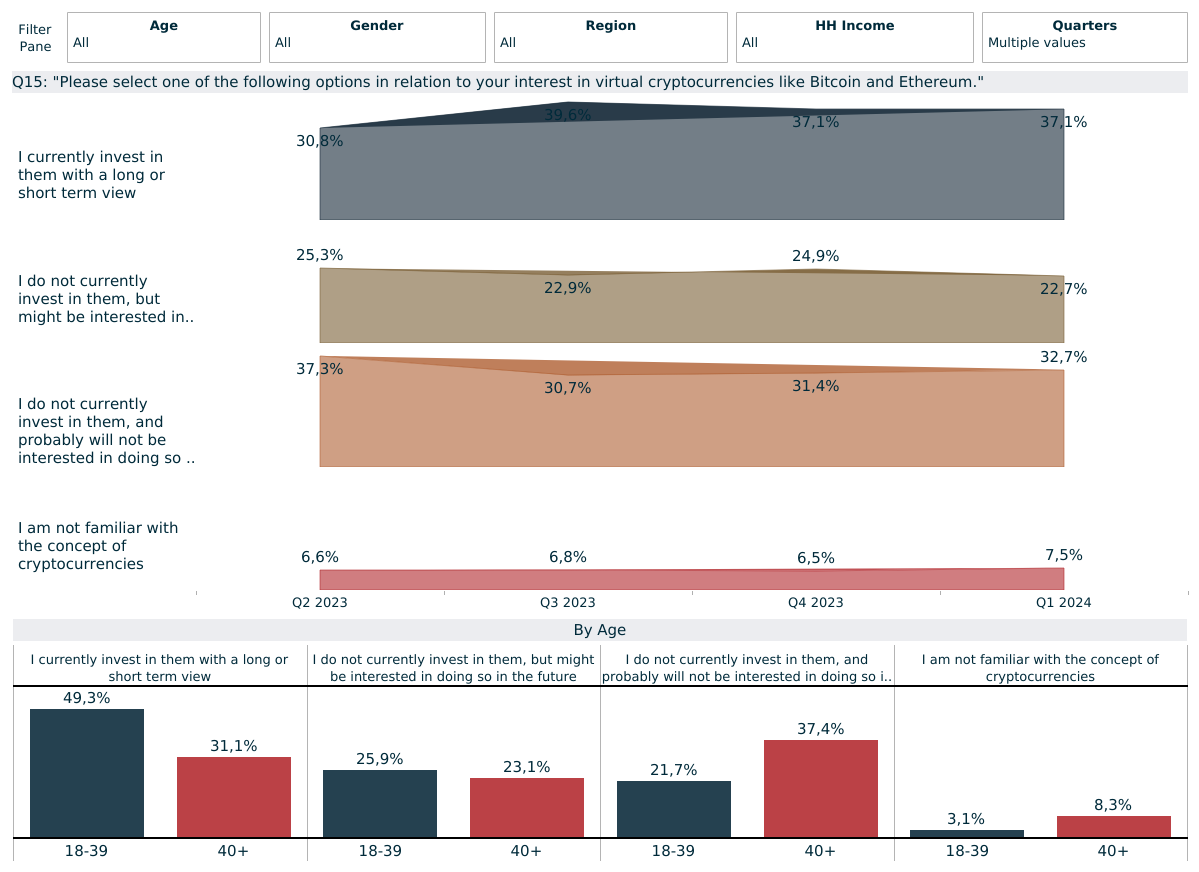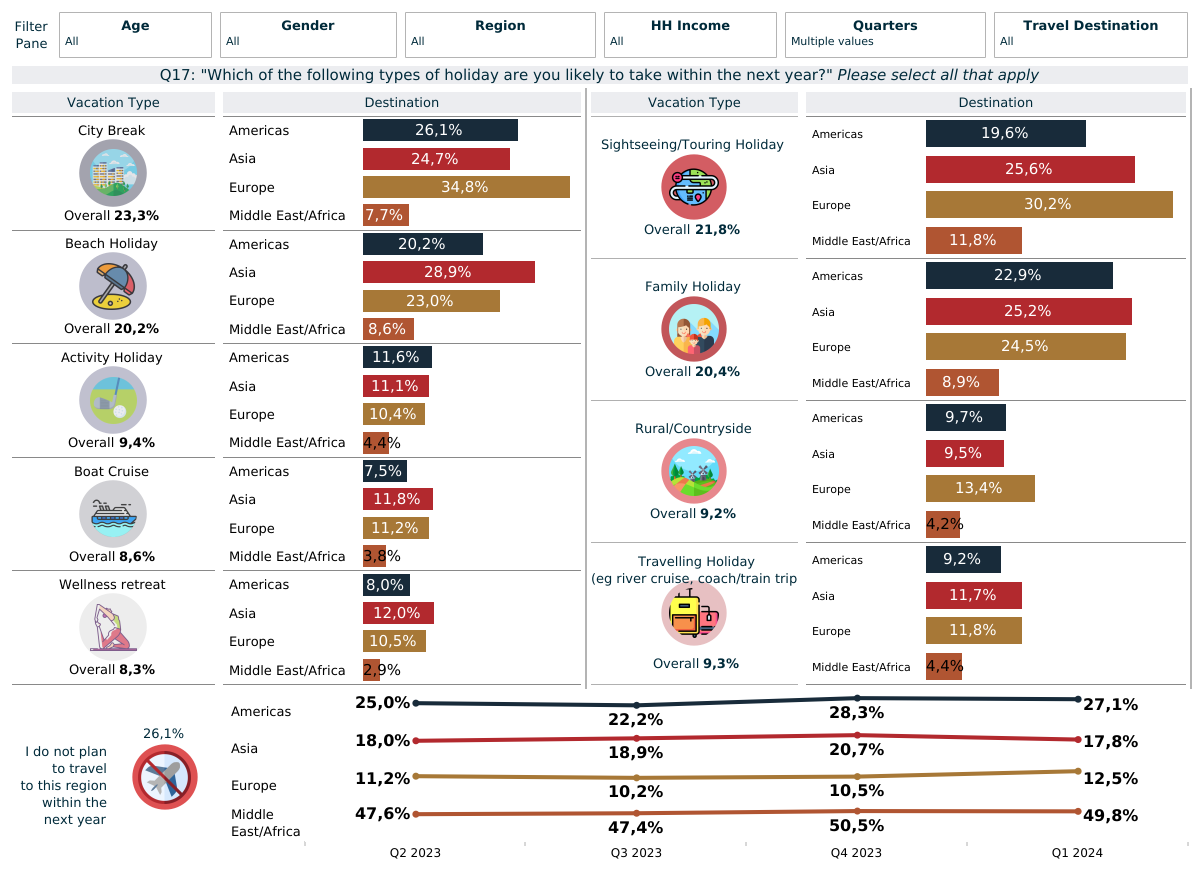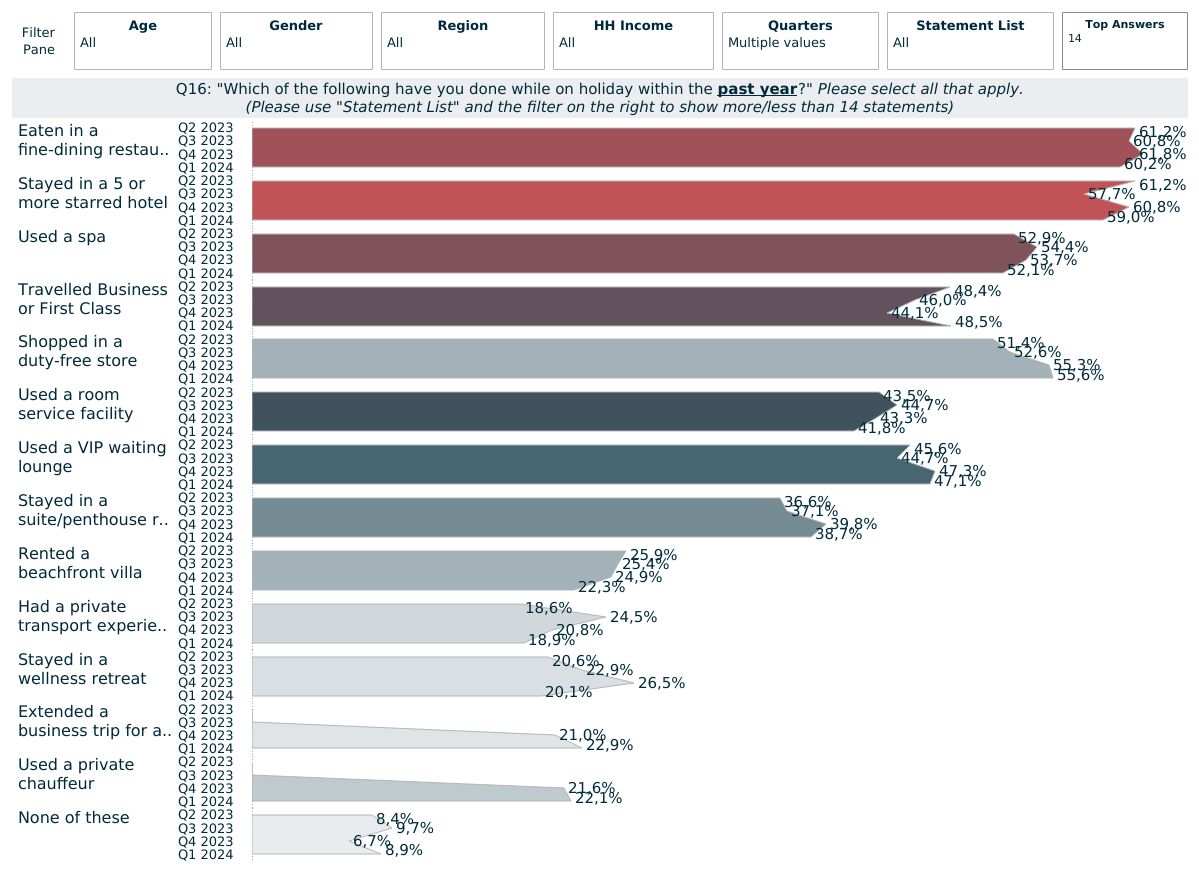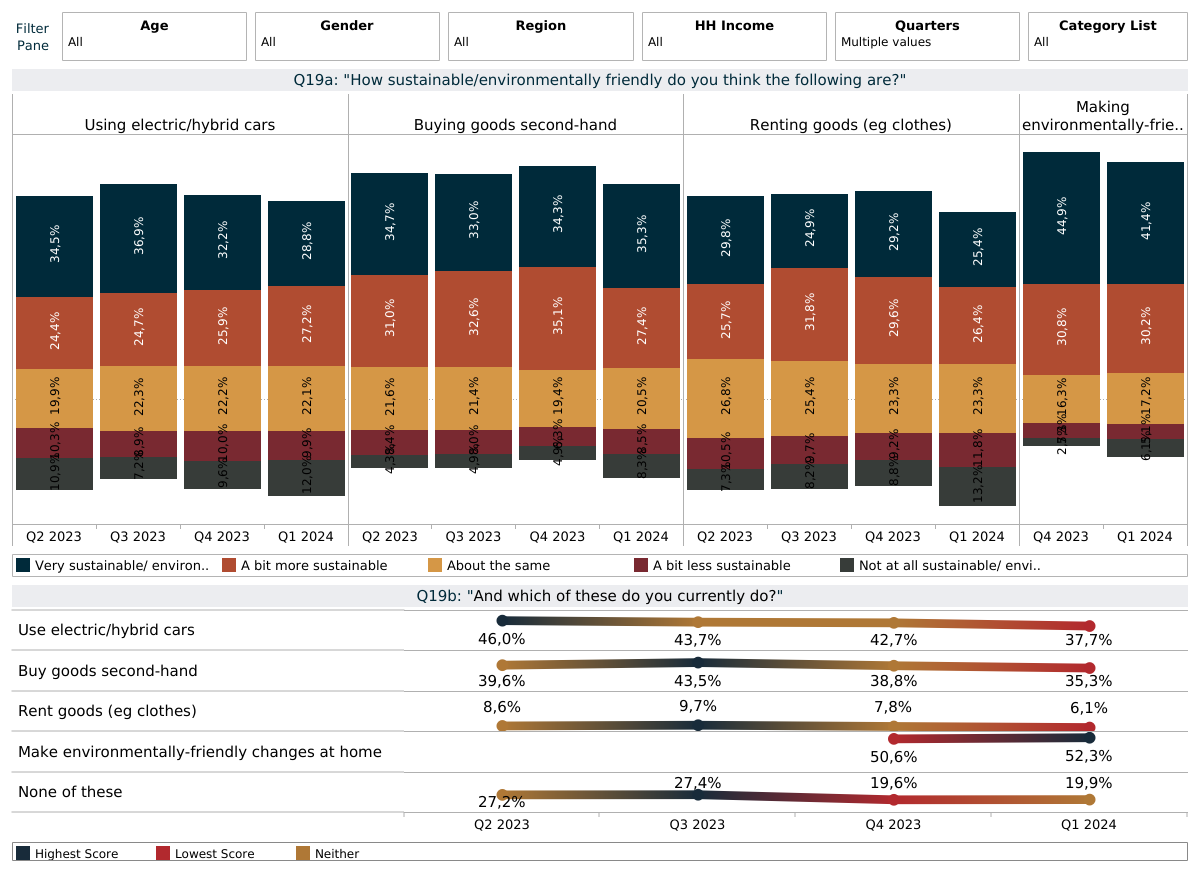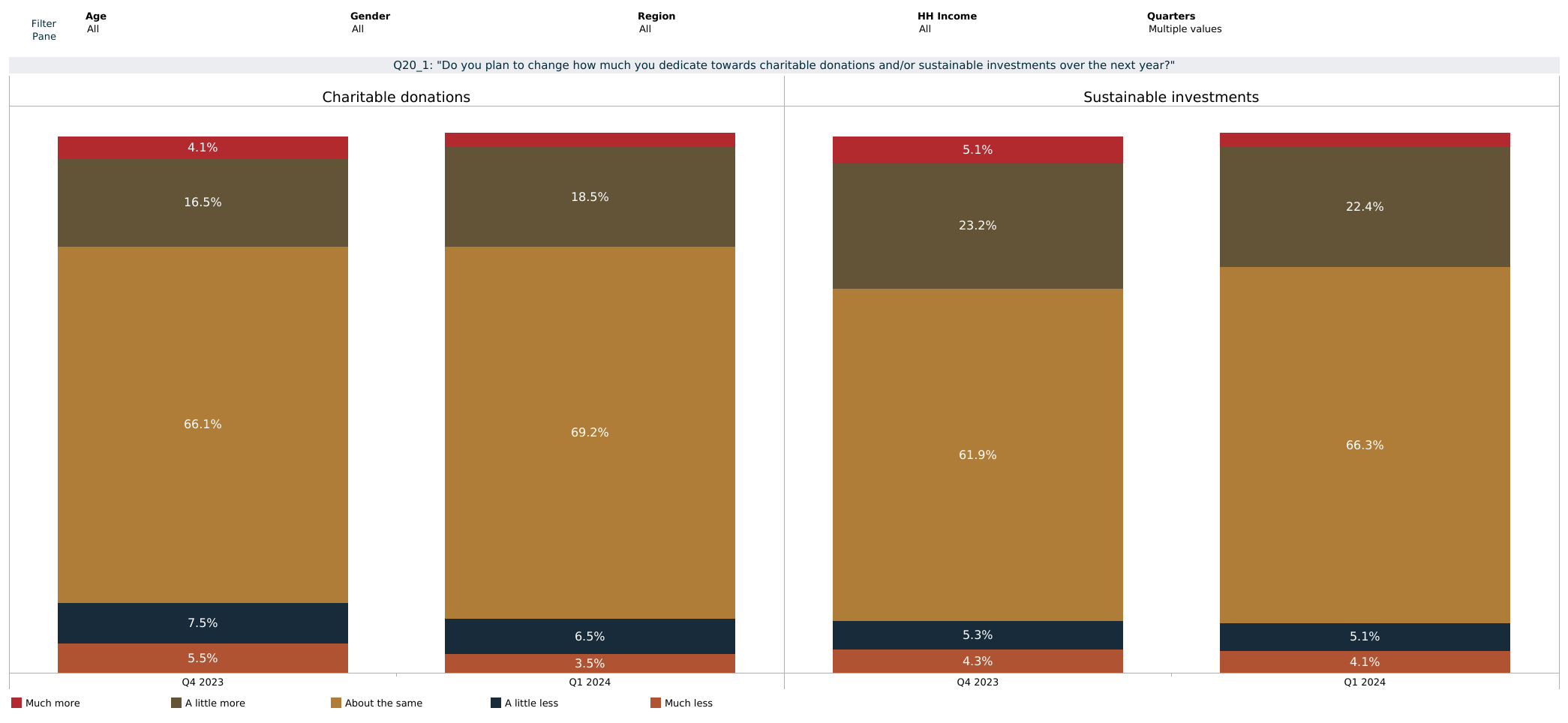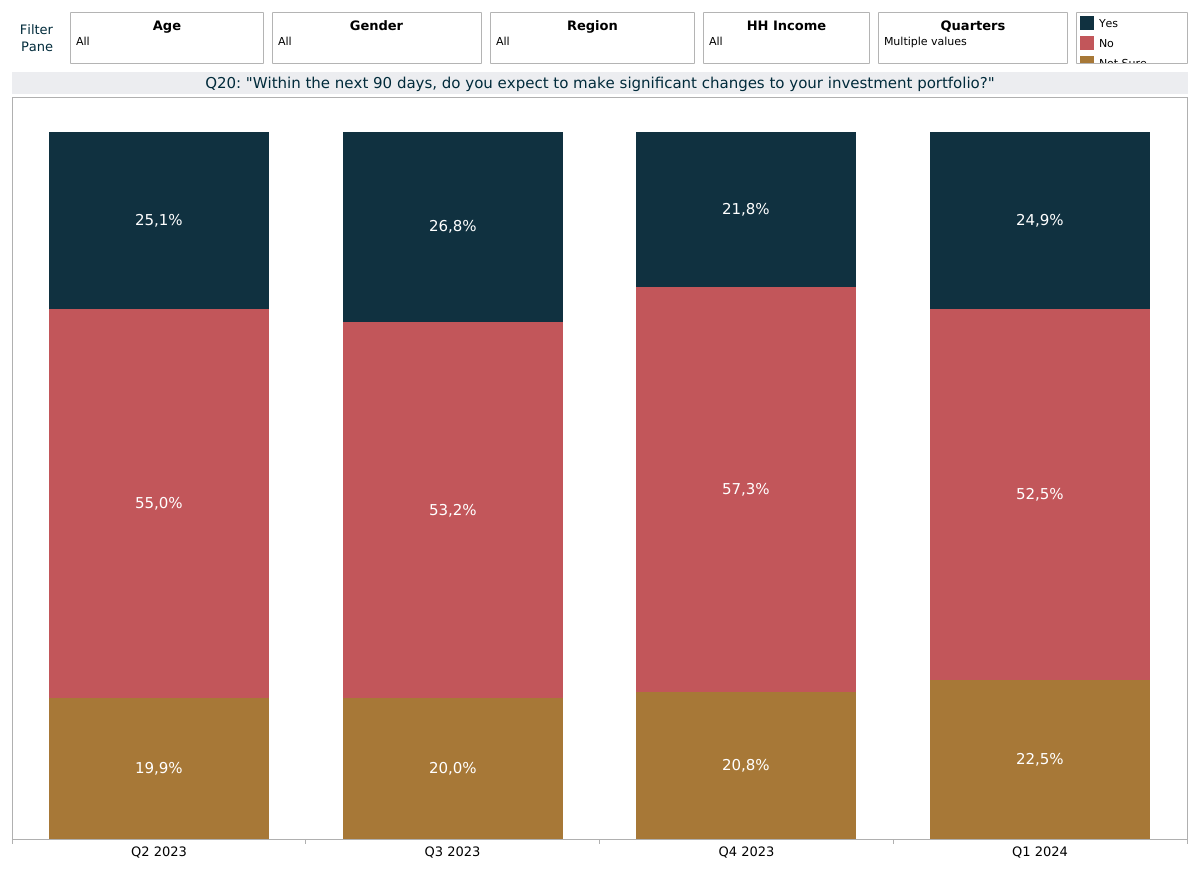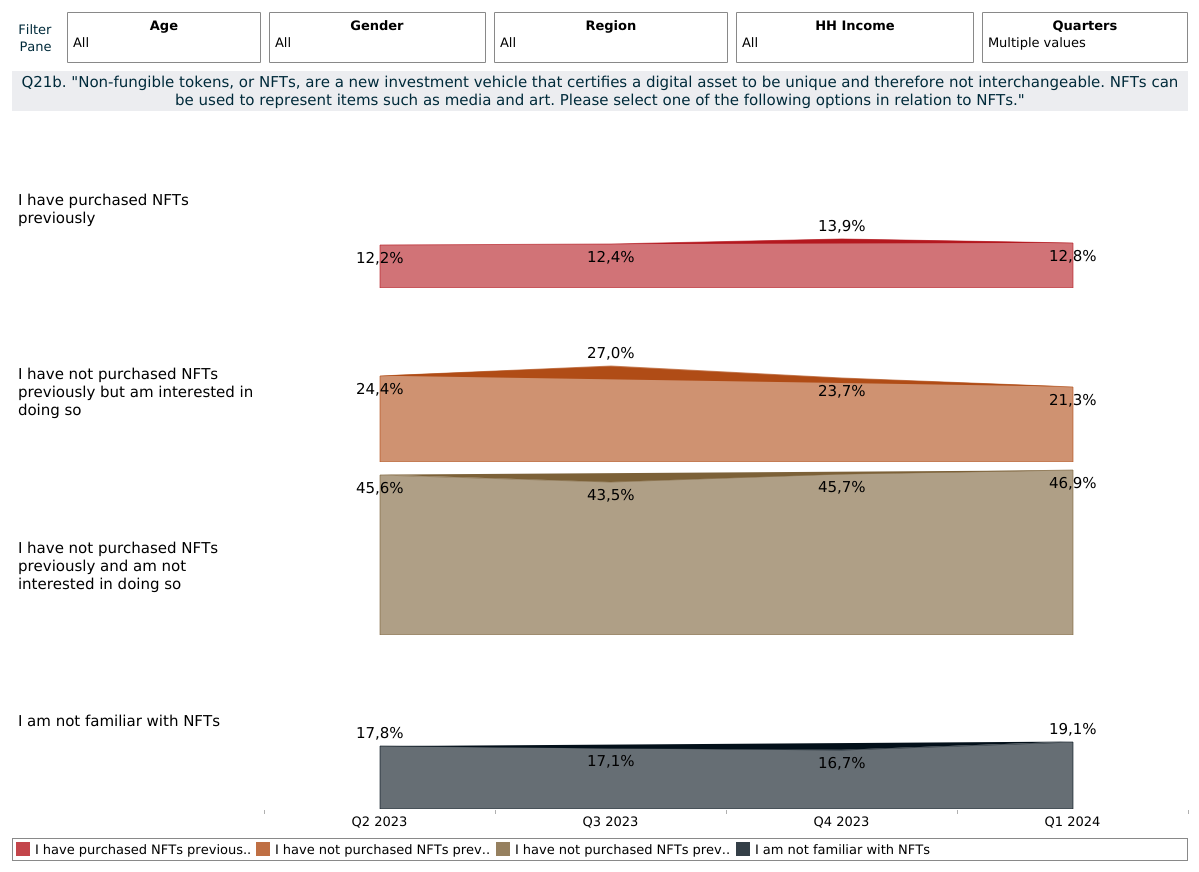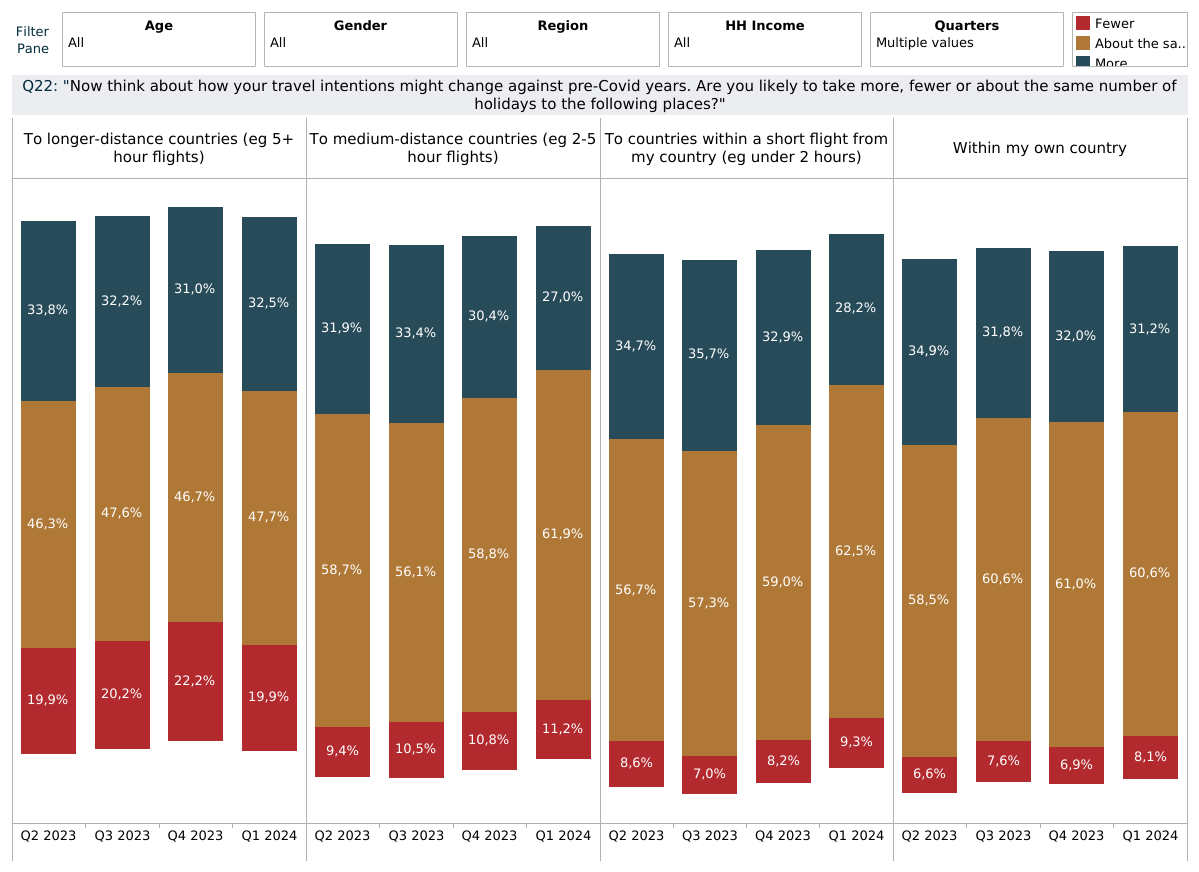ALTIANT Global Luxury AND ASSET MANAGEMENT (GLAM) MONITOR
Q1 2024 RELEASE
I
Q1 2024 RELEASE I
Quarterly GLAM Monitor: Q1 2024
Release date: Avril 2024
Lars Long - Founder & CEO, Altiant
Welcome to the newest edition of Altiant’s Global Luxury and Asset Management (GLAM) Monitor. The monitor focuses on the behaviours and sentiments of our panel of validated global affluent/High Net Worth Individuals.
GLAM has now passed five years of data collection, during which time we have conducted almost 11,000 interviews to construct a comprehensive and evolving view of luxury sentiment and behaviour. The 5+ years of study so far clearly show the significant change and disruption which the world has seen in that period. We hope that the future findings continue to assist your business strategies and decisions in the years ahead.
Hard-hit categories such as retail and travel recovered further in 2023 and are now broadly in line with pre-pandemic norms. However, global issues such as the energy and climate crises, international conflicts and inflation remain significant and continue to impact affluent sentiment.
The monitor contains two main elements for public use. Firstly, there is a quarterly PDF containing the most recent results and key takeaways from this quarter of study. And secondly, all of the data is available within Tableau so that you can reformulate the results according to your own preferences. Age, gender, region and household income filters will enable you to interact with the data and cut it in different ways to identify key differences and trends.
We welcome the free and fair use of our data to meet your individual and business objectives, only asking that you clearly link your readers to the source of the data whenever applicable. As we publish additional iterations, trends will continue to strengthen, enabling you to further enhance your understanding of global luxury consumers. In the event you have any questions about the data, please contact us at glam@altiant.com.
Altiant Founder and CEO, Lars Long
INTRODUCTION TO THE RESEARCH
All data presented in this GLAM monitor has been sourced from Altiant’s manually validated in-house panel of Affluent and High Net Worth Individuals (HNWIs), Luxury Opinions©. This iteration reports on Q1 2024 but will also include trended data from the trackers’ previous quarters. For any additional questions about this research, please contact glam@altiant.com.
For the methodology, we have continued to survey different members of our global panel whenever possible. All respondents can only answer the survey once a year at most. 493 affluent/HNWIs were surveyed between January and March 2024, with 184 in Europe, 156 in North America and 153 in Asia Pacific. 27% of this quarter’s sample was aged 18-39, with 73% aged over 40. The sample was split 56:44 in terms of gender M:F. Since starting the tracker in Q3 2018, we have now conducted almost 11,000 interviews in total, 37% of which were among aged 18-39s (63% over-40) and with a gender split of 50:50.
Normalised to $US, the median household income (HHI) in this quarter was $315k, while the median investible assets stood at $813,000 (exchange rates as per 1st April 2024). This brought the median HHI across all 5+ years’ of study so far to just over $250k, while the Investible Assets median stood at $858,000.
RESEARCH SAMPLE
KEY QUARTERLY CHANGES
Only 7% now expect to spend less on travel in 2024, while 51% expect to spend more, showing that the appetite to spend on luxury holidays remains buoyant.
Half (49%) travelled by business/first-class within the past year, a new tracker high point, suggesting that many wealthy individuals are prioritising travelling in style.
Half (49%) are interested in buying sustainable products such as electric cars or organic clothing. A slightly higher share, 53%, said that they are now concerned about the climate crisis.
A third (33%) now say that they do not currently invest in crypto and do not think they will do so in the future, the second highest point for this metric across the tracker so far.
The share of those who have not purchased NFTs and are not intending to do so remains comfortably higher than the 2022 peak, reaching a new high point of 47% for this question.
Half (49%) travelled by business/first-class within the past year, the highest point since this question was revised from three to one year.
LUXURY PURCHASES
PAST LUXURY PURCHASES (Past 12 Months)
“In which of the following categories have you purchased a luxury brand or service within the past year?”
Total Unfiltered Base: 10,658 global affluent/HNWIs | Source: LuxuryOpinions®/AltiantBefore 2020, travel numbers saw little quarterly variation in our tracker. However, the tourism industry was one of the worst-hit by the Covid pandemic, with regional outbreaks and lockdowns leading to an uneven recovery. Relatively few travellers are now cautious about taking holidays, with travel having returned to pre-pandemic levels.
From 70% in Q1 2022, the share of wealthy individuals saying that they had taken a luxury holiday steadily rose thereafter, stabilising at 87% in Q1 2024. Two-thirds (65%) say that they took multiple trips within the past year. Tourism is now firmly back at the top of the list for categories’ purchasing penetration and comfortably ahead of designer fashion, high-end electronics and leather goods.
Wealth management services, and leather goods have also remained popular and purchased by around three-quarters within the past year. Purchases of leather goods and alcohol see a clear skew towards women, while men are more likely to buy watches and use wealth management services. Luxury automotive (41%) and art and collectibles (38%) remain the least likely categories to have been purchased within the past year.
Luxury Purchase Intent (Next 12 Months)
“Do you expect to spend more or less in the next 12 months, compared to the last 12 months?” - Active buyers, past 12m
Total filtered Base (active buyers) of 10,658 global affluent/HNWIs | Source: LuxuryOpinions®/AltiantAutomotive remains the category which active buyers expect to cut back on most in the year ahead, with 39% expecting to do so (up from 34% in Q1 2023), and only 20% expecting to spend more. Elsewhere, planned purchasing trends for 2024 continue to look positive. Apart from watches (26%), no other category has more than a quarter of its users expecting to spend less in the year ahead, with jewellery the next highest at 23%.
‘Revenge spending’ is evident in many categories, with travel being one of the main beneficiaries. With many having already slashed their holiday spend across 2020-22, only 7% expect to spend less on travel in 2024. On the other hand, 51% expect to spend more, showing that the appetite to spend on luxury holidays remains buoyant.
Wealth management also appears to be well placed. Almost half (44%) expect to use wealth managers more in the year ahead, indicating returning confidence but also a need to plan financially for unforeseen events such as pandemics or to hedge against inflation. Many of the other categories are now showing a comfortably higher share of buyers who plan to spend more in the coming year than they did in the preceding 12 months. Designer fashion, art & collectibles, consumer electronics, watches, alcohol and leather goods are all well-set to appeal to many, with around three-in-ten expecting to spend more in these categories.
“You mentioned that you have not purchased luxury items from the following categories within the last year/Do you think you will make purchases in any of these categories within the next year?”
Art and collectibles remain comfortably the most likely category to not entice new customers over the next year; 82% of non-users do not expect to begin doing so over the next 12 months. Luxury jewellery/watches may also struggle to bring new customers into the category, with around three-quarters not planning to become active buyers. A slightly lower share (64%) of non-car buyers do not expect to buy a car within the next year either (although 36% do expect to do so). Travel may see further benefits from new or returning customers, with almost half of 2023’s non-travellers planning to take a trip in the year ahead.
PURCHASE CHANNELS
“Within the past 12 months, how have you purchased luxury brands or services?”
Total Unfiltered Base: 10,658 global affluent/HNWIs | Source: LuxuryOpinions®/AltiantStores worldwide have now largely reverted to pre-pandemic habits without regulations such as face masks and social distancing. While shopper confidence has largely returned, some affluent consumers may nevertheless continue to favour the convenience of online shopping. Prior to Covid-19, the share of consumers buying luxury goods/services in a physical store hovered around the 85% mark. This fell as low as 67% in Q2 2021 and while there were some fluctuations across 2022 and early 2023, it has stabilised around the 80% mark since (81% in Q1 2024).
The past two years have also seen a notable uplift in online luxury shopping, but this too saw some fluctuation over the last year. Two-thirds (66%) said that they had purchased luxury goods or services via their computer/laptop, rising to 83% of Americans. Meanwhile, almost half (45%) said that they bought luxury goods via their mobile phone, while 17% did so using a tablet. Europeans, men and over-40s comfortably remain the least likely to have shopped via their mobile. It remains important for brands to continue delivering user-friendly websites, particularly for smaller screens, as the popularity of online shopping remains robust.
SOCIAL MEDIA INTERACTIONS
“Have you participated in any of the following activities in relation to luxury brands and services on social media in the past 3 months?”
Total Unfiltered Base: 10,658 global affluent/HNWIs | Source: LuxuryOpinions®/AltiantIn line with online retail prospering, social media has also become more important for many luxury brands. Engaging and sharable content proved to be a lucrative sales channel for brands while lockdowns were in place during the pandemic. Almost half of the Q1 sample said that they had followed a brand (47%) and/or liked or recommended a brand to family, friends or colleagues (48%) within the past three months, both figures broadly level vs the previous quarters. In both cases, women and under-40s continue to be the most likely to do so. Elsewhere, one in five made purchases via social media (18%) or sent a private message to a brand (15%), with under-40s again most likely to do so.
Many brands are allotting increasing parts of their marketing budgets to social media influencers. With 27% of wealthy individuals saying that they had followed influencers within the past three months, this can be a lucrative option if well-chosen partners are utilised. Over-40s, men, Europeans and Asians are the least likely groups to do so at under one in five. Finally, one-third (31%) reported that they made none of these social media interactions within the past three months.
LUXURY & SUSTAINABILITY
Attitudinal Statements
“Which of the following statements about luxury do you agree with?”
Total Unfiltered Base: 10,658 global affluent/HNWIs | Source: LuxuryOpinions®/Altiant
The Covid-19 pandemic led to many affluent/HNWIs reassessing their purchases of luxury goods, often instead preferring to spend their money on luxury experiences: two in five (43%) say that they prefer luxury experiences over goods/products. As seen in Section 1, travel has now returned to pre-2020 levels, and sustainable/ethical travel will be at the heart of this recovery: one-third say that they will prioritise responsible travel in the future. Meanwhile, 14% say that they have reconsidered their travel plans due to climate changes such as heatwaves and wildfires.
In a similarly green vein, many people are opting to rent items rather than buy them, particularly in categories such as fashion and jewellery. Sustainability and tapping into the circular economy are at the heart of this growth, although that only 7% are interested in renting clothes indicates that this growth is likely to be gradual. Meanwhile, 19% say that they are interested in buying second-hand clothes, though this figure lags behind in Asia where still only 15% are keen.
Increasing numbers of wealthy individuals are also gravitating towards brands which have a genuine sustainable ethos and positioning. Half (49%) are interested in buying sustainable products such as electric cars or organic clothing. A slightly higher share, 53%, also said that they are now concerned about the climate crisis, while 43% are trying to reduce their personal carbon footprint in everyday life. Meanwhile, one-quarter (24%) have reduced or eliminated their consumption of meat, rising to 33% in Europe but standing at just 9% in Asia.
Back to Top
Luxury & Sustainability: The Importance of Sustainability
“How sustainable/environmentally-friendly do you think the following are? / And which of these do you currently do?
New Question. Total Unfiltered Base: 4,840 global affluent/HNWIs | Source: LuxuryOpinions®/AltiantThe ongoing climate crisis means that many wealthy individuals are now scrutinising their own actions and how they are contributing to, or alleviating, this issue. Perceived green credentials can be highly influential, and the growth of the rental and second-hand market has been built around the circular economy.
While some studies have questioned the legitimacy of these claims, consumer perception is key. This appears to be broadly positive as over half (52%) think that renting goods is either somewhat or very environmentally-friendly, rising to 63% for buying goods second hand. One-third (35%) say that they are already buying goods second-hand, while only one in five (6%) are currently renting them.
Another significant behavioural change is the increasing need to find alternative fuels for driving. The growth of electric and hybrid cars has been broadly positive, albeit with some ongoing concerns about the convenience of charging and battery reliability (‘range anxiety’). Nevertheless, 29% think that these cars are very environmentally-friendly, with a further 27% thinking they are somewhat so. Two in five (38%) have already made the switch to electric or hybrid cars, with uptake likely to rise in the coming years as the technology of these cars continues to improve and BEVs are phased out.
Many wealthy individuals are also making sustainable changes at home, for example by investing in solar panels or heat pumps. Almost three-quarters (72%) believe that these actions are very or somewhat environmentally friendly, with broadly high response across the demographics. Just over half (52%) have already taken some of these green steps, rising to 61% among under-40s.
“How important is it to you that luxury brands commit to adopting policies that promote environmental protection, social responsibility and ethical behaviour (sustainable luxury)?”
New Question. Total Unfiltered Base: 4,840 global affluent/HNWIs | Source: LuxuryOpinions®/AltiantWhile Covid-19 temporarily shifted some individuals’ immediate focus away from the ongoing climate crisis, this remains one of the most pressing issues globally. 2023 was the warmest year on record and saw several climate-related disasters. This has led to many becoming increasingly demanding of brands to acknowledge and act alongside them in alleviating climate concerns, for example via recyclable materials or carbon offsetting. They are also becoming more aware of ‘greenwashing’ and discerning about brands which make sustainable claims.
Two-thirds (64%) say that it is very or somewhat important to them for brands to do this, with under-40s more likely to say that it is very important to them (34%, vs 23% for over-40s). Only 15% now say that it is not very, or not at all important to them for brands to focus on sustainability, showing the importance of this issue for consumers.
Luxury & Sustainability: Trading up for Sustainability
“Would you be prepared to pay more for a product which positions itself as sustainable luxury?”
Total Unfiltered Base: 10,658 global affluent/HNWIs | Source: LuxuryOpinions®/AltiantDespite some muted responses to brands’ sustainability efforts, many affluent consumers are seemingly prepared to back up their views about environmental protection and sustainability with their money. Only 28% of the Q1 sample are entirely unprepared to spend any more for sustainable/ethical luxury products. Overall, 46% are prepared to spend up to 10% more, which could be a sweet spot for brands to justify a small price premium.
The remaining 26% are prepared to spend more than 10% extra for sustainable/ethical luxury products, with 4%even being prepared to spend more than 25% extra. Trading up for sustainable goods resonates with under-40s than over-40s, especially for the 10-25% extra spending bracket.
Luxury & Sustainability: Sustainable Luxury Champions
“Are there any luxury brands in any industry which you think are good examples of sustainable luxury? If so, which companies?”
Total Unfiltered Base: 10,165 global affluent/HNWIs | Source: LuxuryOpinions®/AltiantOver the course of our tracker so far, a handful of luxury brands have consistently stood out to wealthy individuals as sustainable luxury operators. The likes of Louis Vuitton, Stella McCartney, Gucci and Tesla garner a high share of the response each quarter, with these brands also being among the most cited in Q1. Meanwhile, many wealthy individuals do not state any specific sustainable brands or, even worse, actively mistrust some green claims, something which brands continue to have to work on resolving.
FOCUS ON FINANCE
Global Financial System Stability
“How stable do you feel the global financial system currently is?”
Total Unfiltered Base: 10,165 global affluent/HNWIs | Source: LuxuryOpinions®/AltiantA variety of events have had a major impact upon consumer confidence in global finances in recent years. Covid-19, Brexit, the climate crisis, international conflicts and inflation have all had an influence, with many investors seeing their stocks fall as a result of greater financial uncertainties. From 37% pre-pandemic, the share of respondents who felt that the financial system was either very or somewhat stable plummeted to just 20% in Q2 2020.
While the following 18 months saw some recovery, perceived stability has fluctuated in recent quarters, with the result standing at 22% in Q1. Concurrently, the share of those who think that the financial system is very or somewhat unstable remains high at 56% (with 15% deeming it ‘very unstable’). Only 21% now hold a neutral/uncertain position.
Stock Market Knowledge
“How knowledgeable do you think you are about topics related to the stock market?”
Total Unfiltered Base: 10,658 global affluent/HNWIs | Source: LuxuryOpinions®/AltiantSelf-claimed stock market knowledge has historically shown little quarterly variation in our study, hovering around the 75-80% mark. In Q1 this stood at 80% of respondents who said that they are either very or somewhat knowledgeable, albeit only 19% falling into the top box. Women and Europeans continue to be the least likely groups to state that they are knowledgeable as per this quarter’s data. 16% feel that they have very little stock market knowledge, while only 3% say they have no knowledge at all. Women remain much more likely than men to profess having little or no comprehension of the stock market (32% vs 10%).
Regional Stock Market Confidence
“How do you think the stock markets in your region will perform during the next 12 months when compared to the past 12 months?”
Total Unfiltered Base: 10,658 global affluent/HNWIs | Source: LuxuryOpinions®/AltiantFrom a low point of 33% in Q2 2020, stock market confidence recovered steadily across 2021 and neared 50% at the end of the year as a more bullish stance returned. However, this fell away again last year and dropped as low as 30% in Q2 2022, before recovering in an uneven manner since. Two in five (39%) expect an improvement in performance in the next 12 months, up from 35% in the previous quarter, but still with just 6% expecting their stocks to perform much better. One-third (35%) think that their stock performance will remain about the same while 26% expect a downturn.
PORTFOLIO MANAGEMENT
“Within the next 90 days, do you expect to make significant changes to your investment portfolio?”
New Question. Total Unfiltered Base: 4,840 global affluent/HNWIs | Source: LuxuryOpinions®/AltiantTypically hovering around 30%, the share of wealthy individuals expecting to make significant changes to their portfolios fell back to just 22% in Q4 2023, the lowest point for this metric since this question was introduced in Q4 2021. Q1 saw a small recovery in this figure to 25%, rising to 31% among under-40s. Meanwhile, 53% expect to keep their investments unchanged, while 23% were unsure of their plans.
“Do you plan to change how much you dedicate towards charitable donations and/or sustainable investments over the next year?”
One in five (21%) say that they will be making more charitable donations in the year ahead, a flat figure against Q4 2023 (when this question was introduced to the study). Just over two-thirds (69%) expect to donate about the same, while only 10% anticipate cutting back. A similar pattern emerges for sustainable investments, with one-quarter expecting to increase their sustainable investments (25%), 66% planning to maintain them and only 9% cutting back.
Investing in Cryptocurrencies and NFTs
“Please select one of the following options in relation to your interest in virtual cryptocurrencies like Bitcoin and Ethereum.”
New Question. Total Unfiltered Base: 4,840 global affluent/HNWIs | Source: LuxuryOpinions®/AltiantCryptocurrency continues to attract a high level of media interest amid ongoing controversies. As a result of this high profile, only 8% of the global affluent are now entirely unfamiliar with them. Following a significant drop in 2022, Bitcoin values saw a strong recovery in 2023 and reached a new all-time high in Q1 2024. However, last year’s drop in value saw an increasing share of wealthy investors cashing out of crypto. Q2 2023 saw the share of long-term investors fall from 29% to 20%, although this bounced back a little in the last two quarters of the year.
As of Q1 2024, only 24% invest in them with a long-term view, a flat figure vs Q4 2023. Americans, under-40s and men remain the most likely long-termers, with around 30% of each doing so. The share of short-term investors also fell back from early 2023, stabilising around one in five since (13%). Bitcoin remains the most popular currency by some distance. While some investors only do so for single coins, typically Bitcoin, many also dabble in others such as Ethereum.
Despite last year’s rise in value, the continued unpredictability and volatility of crypto appears to have hardened the opposition among non-investors. From 29% in Q1 2022, the share of current non-investors but who might be interested in doing so fell back steadily last year, remaining at around one in five since (23% in Q1). Another third (33%) now say that they do not currently invest in crypto and do not think they will do so in the future. While this figure is lower than the 37% peak in Q2 2023, it still stands as the second highest point for this metric across the whole tracker so far.
“Please select one of the following options in relation to NFTs.”
New Question. Total Unfiltered Base: 4,840 global affluent/HNWIs | Source: LuxuryOpinions®/AltiantNFTs remain a relatively niche concept despite the hype of recent years. Their widespread coverage and adoption by some brands mean that only 19% are now entirely unfamiliar with them. However, still only one in ten (13%) say that they have previously purchased NFTs as of Q1, rising to 20% of under-40s.
Values of many of the leading NFTs such as those of the Bored Ape Yacht Club are significantly down vs their peak, with few signs of recovery at the time of writing. Nevertheless, luxury brands continue to launch NFTs, albeit at a slower rate than before, a notable example from last year being Louis Vuitton’s ‘Treasure Trunks’ which cost $41,700.
As with crypto investment, there has been a clear rise in negative sentiment among non-investors. Only21%of current non-buyers are nowinterested in buying them, down from 24% in Q4. Meanwhile the share of those who have not purchased NFTs and are not intending to do so is still comfortably higher than in 2022 at 47%. The latter figure represents a new high point since we started tracking this question in Q4 2021.
FOCUS ON TRAVEL
Luxury Travel Experiences
“Which of the following have you done while on holiday within the past year?”
[Note, this question has been changed from a three-year time period, to one-year, in response to the Covid-19 pandemic]
Total Unfiltered Base: 10,658 global affluent/HNWIs | Source: LuxuryOpinions®/AltiantTravel has rebounded strongly over the past two years, with very few remaining Covid-related restrictions in place. China was the last country to remove its final travel restrictions in January 2023, but has reported in-bound tourism numbers still lagging behind pre-pandemic levels. While many individuals still seem to favour domestic trips, or going to countries closer to home, international holidays are broadly back on the rise (see Section 1).
Different holiday types see wide variance in popularity across the regions, but all types saw a downturn in interest since the outbreak of Covid-19. City breaks in Europe and the US were hit particularly badly, a likely reflection of travellers’ ongoing concerns about being in overcrowded places where their exposure to Coronavirus may be elevated. City breaks, sightseeing/tourist holidays and family holidays within Europe are now back at pre-Covid levels, albeit many are now looking for lesser-known destinations off the beaten track.
Rural/countryside (e.g. glamping) and family breaks continue to be among the most resilient holiday types, reflecting the desire for many travellers to remain close to family and distanced from crowds and strangers. Multi-generational trips in particular are now proving to be highly popular with the affluent.Wellness holidays/retreatsare also likely to retain their popularity the wealthy look to improve their physical and mental health after the stress of the past two years.
Holiday Booking Intentions
“Which of the following types of holiday are you likely to take within the next year?”
Total Unfiltered Base: 10,658 global affluent/HNWIs | Source: LuxuryOpinions®/Altiant[Note: in Q4 2021 this question was from a three-year time period to one-year]
Luxury remains important right from the start of our respondents’ holidays, including at the airport: 56% shopped in a duty-free store, 47% used a VIP waiting lounge and 49% travelled by business/first-class within the past year. The latter figure represents a new high point since this question was revised from three to one year, suggesting that many wealthy individuals are prioritising travelling in style.
5* or more hotels remain highly popular, used by 59%, while 39% stayed in a suite/penthouse room and 22% rented a beachfront villa. Fine dining (60%) and room services/concierges (42%) also appeal to many affluent travellers. Spas were used by more than half (52%) within the past 12 months, with under-40s remaining the most likely users. Wellness tourism continues to flourish as more luxury hotels acknowledge the appeal of relaxation facilities, especially in the wake of Covid. Indeed, 20% say that they had been to a wellness retreat over the past year.
Many wealthy individuals are also extending a business trip for a holiday (workations). One in five (23%) say that they have done this over the past year, rising to 29% of Americans but falling back to just 19% in Europe. One in five also say that they have had a private transport experience (19%) such as a helicopter ride or used a private chauffeur (22%) within the past year. Americans are the most likely to have treated themselves on their luxury holidays in most of these listed activities, with very little overall change vs the previous quarter.
Post Covid Luxury Travel
“Thinking about how your travel intentions are likely to change against pre-Covid years, are you likely to take more, fewer or about the same number of holidays to the following places?”
New Question. Total Unfiltered Base: 4,840 global affluent/HNWIs | Source: LuxuryOpinions®/AltiantSpontaneous outbreaks of Covid variants mean that some wealthy travellers may remain watchful about planning their holidays, both in terms of frequency and location. A third (31%) say that they are likely to book more holidays within their own country in the coming years, with only 8% expecting to cut back and the remaining 61% taking about the same number of domestic trips. These results are almost identical to the previous quarter.
Shorter-haul flights may remain desirable in the immediate future as some travellers still look to minimise their time on-board where possible, or to avoid air travel disruption. For airlines, the challenge remains continually restoring confidence so that travellers feel comfortable about spending longer periods on planes. Just over one-quarter say that they expect to take more short- and medium-haul flights in the coming years, with only one-in-ten cutting back. A slightly higher share (33%) expect to take more long-haul flights, although two-in-ten plan to cut back on these.
Publications contained in the Altiant Knowledge Center are free to use, we simply require proper attribution. In no event shall Altiant be liable for any indirect, special or consequential damages in connection with any use of the provided data. Altiant does prohibit the selling of any information contained within or derived from these reports and monitors.